|
|
|
|
|
|
UPDATE: (7/24/15) -- INTERIOR AND
ENVIRONMENT APPROPRIATIONS BILL DID NOT PASS THE HOUSE, DUE TO OTHER MORE
PRESSING ISSUES. THE SENATE HAS NO PLANS TO BRING THE BILL TO THE
FLOOR!
Updated 24 July 2015
|
|
|
|
| |
|
Action Alert: #TWEETSTORM at
Congress #KeepWolvesListed and Protect the ESA -- Click here for
more information from The Wolves of Douglas County Wisconsin!
BREAKING
NEWS: On 9 June 2015, the Interior and Environment Appropriations
Subcommittee released their draft bill for FY2016. Included in the legislation
is a rider which would (among other things) require the Secretary of the
Interior to delist gray wolves in Wyoming, Minnesota, Wisconsin and Michigan
from the list of endangered species. This rider, Section 121 of the
Interior and Environment Appropriations bill, provides for the delisting of
gray wolves and would prohibit that rule from being subjected to future
judicial review.
UPDATE:
(7/24/15) -- INTERIOR AND ENVIRONMENT APPROPRIATIONS BILL DID NOT PASS THE
HOUSE, DUE TO OTHER MORE PRESSING ISSUES. THE SENATE HAS NO PLANS TO BRING THE
BILL TO THE FLOOR!
You can read more about the "poison pill" riders to
the appropriations bill here..
Fortunately,
Representatives Grijalva and Hanna will offer an amendment that would remove
the harmful ivory rider, and Representative Tsongas will offer an amendment to
remove the wolf rider.
Please call your U.S. Representative, your two U.S. Senators (plese see link
below to Find your
US Congressmen). Ask them to OPPOSE this
rider, Section 121 of the Interior and Environment Appropriations bill, as well
as any other bill or rider seeking to remove wolves once again from the
protection of the Endangered Species Act!
ASK THEM TO "Please vote “yes” on
the Grijalva-Hanna ivory amendment and Tsongas wolf amendment to the Interior
Appropriations bill."
Ask them NOT to
delist wolves through Congressional intervention - science not politics should
dictate wildlife management. Policy decisions should be argued on their own
merits and should not be included in appropriations.
 Find your US
Congressmen Find your US
Congressmen 
 More Details on the Rider More Details on the Rider 
|
| |
RIBBLE, KLINE, AND NEWHOUSE
BILLS SEEK TO DELIST WOLVES FROM THE ENDANGERED SPECIES ACT ONCE AND FOR
ALL!
 THE GOOD NEWS: On Friday, 19 December 2014, Federal
District Court for the District of Columbia handed down a decision returning
wolves in the Great Lakes Region, including Wisconsin, Michigan, and Minnesota,
to the Federal Endangered Species List. (You can read
Judge Beryl A. Howell's decision in its entirety here.) This
meant NO "wolf harvest" (hunting) season, and of course, NO use of
dogs to track and train in wolves (by federal law) THE GOOD NEWS: On Friday, 19 December 2014, Federal
District Court for the District of Columbia handed down a decision returning
wolves in the Great Lakes Region, including Wisconsin, Michigan, and Minnesota,
to the Federal Endangered Species List. (You can read
Judge Beryl A. Howell's decision in its entirety here.) This
meant NO "wolf harvest" (hunting) season, and of course, NO use of
dogs to track and train in wolves (by federal law)
THE BAD NEWS: Wisconsin Representative Reid Ribble (H.R.884), Representative John Kline of Minnesota (H.R843), and Rep. Dan Newhouse (H. R. 1985) have all introduced legislation
to remove wolves from the protection of the Endangered
Species Act (ESA) once and for all. If passed, these laws would allow
the resumption of aggressive state-based population reduction programs
(trapping, hunting, and, in WI, hounding) -- and proposed bills include the
phrase "shall not be subject to judicial review," which means there
would be NO legal recourse!
WHAT YOU CAN DO ABOUT IT: PHONE AND WRITE TO your
U. S Congressmen in Washington DC (the Representative of your district and BOTH
of your Senators), inform them of the dangerous bills once again seeking to
delist wolves from the protection of the ESA and ask them to:
OPPOSE H.R843, H.R.884, H.R. 1985, and any other bill or
rider to remove wolves once again from the protection of the Endangered Species
Act.
SUPPORT the January 27, 2015 petition to US Fish &
Wildlife Service which down-lists wolves from "endangered" to
"threatened" status under the ESA (thus allowing for "lethal
control" of specific problem wolves to control depredation of livestock,
if deemed necessary).
Click here for more information on the petition and/or
Read
entire petition here.
SUPPORT a National Wolf Recovery Plan based on science,
not emotion or lobbying by special interest groups.
 Find your US
Congressmen Find your US
Congressmen 
Many US Congressmen
would prefer that you contact them by email. You will find an email form or
address on their websites.
Click here to find
out how to contact your US Congressmen
Please see below for additional information and talking points that will give
you a starting point for your own letters. PLEASE NOTE:
it is very important that you write your own unique letter, in your own
"voice" and from your own "perspective."
Try to keep your
message brief, and be sure to give your name, address, and phone number.
Please, ALWAYS be polite and respectful. Name-calling, and rude or abusive
letters or emails will hurt, rather than help, our cause.
|
|
 Sample Message
Format Sample Message
Format  Talking Points Talking Points  Find your US
Congressmen Find your US
Congressmen 
 MI Senator Gary
Peters letter to the U.S. Fish and Wildlife Service
(pdf) MI Senator Gary
Peters letter to the U.S. Fish and Wildlife Service
(pdf) 
 Open
Letter to Members of Congress from Scientists on Federal Wolf Delisting
(pdf) Open
Letter to Members of Congress from Scientists on Federal Wolf Delisting
(pdf) 
Senator Gary
Peters letter to the U.S. Fish and Wildlife Service
 Letter to Secretary Jewell on Gray Wolves March 4 2015
(pdf) Letter to Secretary Jewell on Gray Wolves March 4 2015
(pdf) 
 WI Wolf Hunt in Brief WI Wolf Hunt in Brief  "Media/Articles" page "Media/Articles" page

 Wolf Hunting in Wisconsin: Mainstream Hunters Speak
Out Wolf Hunting in Wisconsin: Mainstream Hunters Speak
Out 
|
|
 Sample Message
Format: Sample Message
Format:
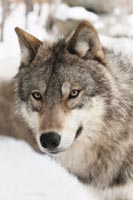 Below is a sample
message format to give you a starting point for your own sentiments regarding
the passage of a Federal law removing wolves from the protection of the
Endangered Species Act. Feel free to put any of the Talking Points or other resources provided on this
website into your own words as a starting point for your own sentiments and
experiences. Remember, PLEASE always be respectful
and courteous! Name-calling, and rude or abusive letters will
hurt, rather than help, our cause. Below is a sample
message format to give you a starting point for your own sentiments regarding
the passage of a Federal law removing wolves from the protection of the
Endangered Species Act. Feel free to put any of the Talking Points or other resources provided on this
website into your own words as a starting point for your own sentiments and
experiences. Remember, PLEASE always be respectful
and courteous! Name-calling, and rude or abusive letters will
hurt, rather than help, our cause.
NOTE: On 4 March 2015, Natural Resources Minority Leader
Juan Grijalva and 78 other members of Congress sent a letter to Interior
Secretary Sally Jewell, urging her support of the petition to downlist gray
wolves to protected. Please take a minute to read the
Letter to Secretary
Jewell on Gray Wolves March 4 2015 (pdf). If your US Congressman is one of
the signers, PLEASE thank him/her!.
 Find your US
Congressmen Find your US
Congressmen 
The Honorable (legislator's
name)
His/her address
City, State, Zip
Dear Sen/Rep Name:
I am
writing to ask you please to OPPOSE H.R 843, H.R. 884, and any
other legislation that would remove wolves once again from the protection of
the Endangered Species Act (ESA).
I also
ask that you SUPPORT the January 27, 2015 petition to US Fish
& Wildlife Service which down-lists wolves to "threatened" status
under the ESA (an excellent compromise measure that will allow for "lethal
control" of specific "problem" wolves to control depredation of
livestock, if necessary.)
[In one or
two short paragraphs, state why you feel that delisting and/or hunting wolves
is wrong. It is important that you tell them this in your own
words!]
Thank your
representative for his support.
Sincerely,
Your Name
Your Address
Please note: You
MUST include your name and address. Your legislator won't pay much attention to
what you have to say if this information isn't included--if your email or
letter even reaches his / her desk.
|
Top
 Talking
Points: Talking
Points:
1. Background
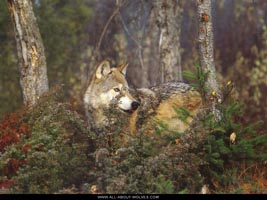 Wisconsin
Representative Reid Ribble, Minnesota Representative John Kline, and Washington
Represenative Dan Newhouse are leading the effort for legislation to remove
wolves from the protection of the Endangered Species Act (ESA) once and for
all. If passed, these laws would allow the resumption of
aggressive state-based population reduction programs (trapping, hunting, and,
in WI, hounding) -- and proposed bills include the phrase "shall not be
subject to judicial review," which means there would be NO legal recourse!
We feel that there will likely be even more bills of the same type coming up. Wisconsin
Representative Reid Ribble, Minnesota Representative John Kline, and Washington
Represenative Dan Newhouse are leading the effort for legislation to remove
wolves from the protection of the Endangered Species Act (ESA) once and for
all. If passed, these laws would allow the resumption of
aggressive state-based population reduction programs (trapping, hunting, and,
in WI, hounding) -- and proposed bills include the phrase "shall not be
subject to judicial review," which means there would be NO legal recourse!
We feel that there will likely be even more bills of the same type coming up.
The Kline bill is H.R.843,
the Western Great Lakes Wolf Management Act of 2015 and seeks "To prohibit
treatment of gray wolves in Minnesota, Wisconsin, and Michigan as endangered
species, and for other purposes." It was introduced on 10
February 2015, and was referred to the House Committee on Natural Resources.
The text of the bill states, in part, "Any wolf in Minnesota,
Wisconsin, or Michigan shall not be treated under any status of the Endangered
Species Act of 1973 (16 U.S.C. 1531 et seq.), including as an endangered
species, a threatened species, an essential experimental population, or a
nonessential experimental population." . You can read more about
H.R.843, including ful text, committee assignments and cosigners,
here.
The Newhouse bill , H.R.
1985, the Pacific Northwest Gray Wolf Management Act of 2015, is a companion
bill to H.R.843, seeking "To prohibit treatment of gray wolves in
Washington, Oregon, and Utah as endangered species, and for other purposes.
." It was introduced on 23 April 2015, and was referred to
the House Committee on Natural Resources. The text of the bill asks, in part,
"Any wolf in a covered State shall not be treated under any status of
the Endangered Species Act of 1973 (16 U.S.C. 1531 et seq.), including as an
endangered species, a threatened species, an essential experimental population,
or a nonessential experimental population. " .You can read more about
H.R.1985, including the full text, committee assignments and cosigners,
here.
The Ribble bill is H.R.884,
"To direct the Secretary of the Interior to reissue final rules relating
to listing of the gray wolf in the Western Great Lakes and Wyoming under the
Endangered Species Act of 1973, and for other purposes." It
was introduced on 11 February 2015, and was referred to the House Committee on
Natural Resources. The text of the bill asks that the former delisting
provisions for gray wolves in the Great Lakes and Wyoming be reinstated,
"without regard to any other provision of statute or regulation that
applies to issuance of such rule. Such reissuance shall not be subject to
judicial review." According to Rep. Ribble, the bill would simply "allow the
decision of the Fish & Wildlife Service to delist the gray wolf from the
Endangered Species Act to stand. It does not alter the Endangered Species Act
in any way, nor does it impede the Fish & Wildlife Service from relisting
the gray wolf again in the future." .You can read more about H.R.884,
including the full text, committee assignments and cosigners,
here.
Delisting wolves in this
manner sets a bad precedent and threatens all species protected under the
Endangered Species Act. If congressmen can get wolves delisted,
there might be no stopping other delisting efforts for far less beloved and
notable species. Federal oversight could be removed, one species at a time, and
the law entirely dismantled.
Survey results in Wisconsin
and voter response in the 2014 election in Michigan show that an overwhelming
majority of residents of these states are AGAINST the trophy hunting and
trapping of wolves. So, why are Rep. Ribble and other
congressmen ignoring the wishes of the majority of their constituents and
pressing the issue on a Federal level at the behest of small special interest
groups? (Keep Michigan Wolves Protected Declares Victory for Wolves and
Voter Rights)
Livestock depredation is
given as the main reason wolves should be hunted -- but the percentage of
livestock actually killed by wolves is relatively small. (Wisconsin Ag Groups Push Congress to Delist Wolves) We
concede that in some cases, livestock depredation is a valid concern. However,
according to the
2014 Wolf Depredation Report, WI DNR, the actual numbers of
confirmed or probable kills in Wisconsin in 2014 are relatively small: around
28 cattle, mostly calves, killed and 2 injured; 2 pet dogs killed, and 22
hunting dogs killed -- 21 hounds and one bird dog -- and 7 hounds injured). In
addition, the report shows about a dozen reports "verified wolf harassment
or threats" to livestock/livestock herds, and 4 reports of threats to
Health & Safety.
Previous Wisconsin Department of Natural
Resources Wolf Management Plan contained effective measures for
"controlling nuisance wolves and reimbursing landowners for losses caused
by wolves" without the use of hunting. See
2014 Wolf Depredation Report, WI DNR for numbers and types
of livestock, hunting dogs, pets, etc. killed and injured during the past year,
as well as verified harrasment or threats and unconfirmed complaints. Note that
Wisconsin has a program for reimbursing livestock and dog owners who have
documented cases of death or injury of domestic animals/ livestock by wolves
UNLESS it's a dog either training for or actually hunting wolves.
The depredation in MI has been exaggerated;
please see
Michigan's wolf hunt: How half truths, falsehoods and one
farmer distorted reasons for historic hunt and
The Michigan myth: How lawmakers turned this true wolf story
into fiction for details.
Some legislators claim that
wolves are a major threat to humans, but reports show that since 2000, only TWO
human deaths have been attributed to wild wolves in North America.
Wolves are essentially shy around humans and try to avoid them.
See
Wolf Attacks More Myth Than Reality for details.
Delisting wolves through
legislation such as Rep. Ribble and Rep. Kline propose, with the phrase
"shall not be subject to judicial review," is just plain wrong. It
can potentially weaken the Endangered Species Act as a whole, and, in Rep.
Ribble's case, is disrespectful to the majority of folks who put him into
office.
On January 27, 2015,
22 state and national organizations filed a petition with the US Fish &
Wildlife Service to down-list wolves to "threatened" status under the
ESA (thus allowing for "lethal control" of wolves to control
depredation of livestock, if deemed necessary). If
adopted, the proposal would continue federal oversight and funding of wolf
recovery efforts and encourage development of a national science-based recovery
plan for the species, while still allowing the U.S. Fish and Wildlife Service
the flexibility to permit state and local wildlife managers to address specific
wolf conflicts. "Lethal control" means the targeting of specific
"problem" wolves, not state-wide indiscriminate hunting. In our view, the Petition offers a balanced and intelligent
compromise to wolf management concerns. (More information on the petition) and (Read
entire petition here)
On 18 February 2015,
more than 50 world-renowned wildlife biologists and scientists, many of whom
have devoted their entire professional careers toward understanding the social
and biological issues surrounding wolves in North America, sent a letter to
Congress urging members to oppose any efforts to strip federal protections for
wolves in the contiguous 48 states. Please take a minute
to read
An
Open Letter to Members of Congress from Scientists on Federal Wolf
Delisting.
On 4 March 2015,
Natural Resources Minority Leader Juan Grijalva and 78 other members of
Congress sent a letter to Interior Secretary Sally Jewell, urging her support
of the petition to downlist gray wolves to protected.
Please take a minute to read the
Letter to Secretary
Jewell on Gray Wolves March 4 2015 (pdf).
2. The Hunt
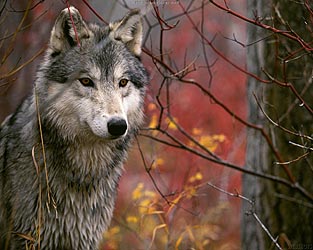 Wolf
management programs that include hunting seem to be governed predominantly by
special interests and not best available science. Please see
Wisconsin's Proposed Wolf Reduction Worries Scientists,
Journal Sentinal: Even insiders did not know who wrote the WI
wolf hunt bill, and
Republicans in Haste to “Harvest” Wolves. Wolf
management programs that include hunting seem to be governed predominantly by
special interests and not best available science. Please see
Wisconsin's Proposed Wolf Reduction Worries Scientists,
Journal Sentinal: Even insiders did not know who wrote the WI
wolf hunt bill, and
Republicans in Haste to “Harvest” Wolves.
It's NOT a "hunter's
rights" issue -- we're hearing from more and more hunters who are AGAINST
trophy hunting and trapping of wolves. A lifelong waterfowl
hunter tells us, "I have been a hunter since my dad took me hunting. I am
an avid and ethical waterfowl hunter who took both sons and taught them to hunt
watervowl based on the ethics that I was brought up on. I am opposed to the
wolf hunt in general.... [C]hange starts with one person, an ethical hunter who
is appalled with the wolf situation." We've found that many
"mainstream" hunters agree. The idea of "trophy hunting"
doesn't set well with most of the people we've heard from, and on 13 November
2012, a group of mainstream Wisconsin hunters received permission to file a
legal brief with the Court voicing their opposition, as life-long hunters and
land-owners, to the unrestricted use of dogs for hunting wolves and training
for such hunting. Please see:
Mainstream Hunters Speak
Out.
-
The majority of the 528
wolves "harvested" in the three Wisconsin hunts have been killed
using steel-jawed leghold traps. We, as well as many hunters,
consider these traps "unsporting" and cruel, as well as dangerous for
curious bird dogs. Trapped wolves struggle and suffer -- often for hours --
until the trapper returns to kill them. Many other unsuspecting animals find
themselves ensnared in these painful and deadly traps, also (including the
occasional pet dog enjoying the great outdoors with its family).
To our shame, Wisconsin is
the ONLY state in the country to allow the use of dogs to track and trail
wolves, with nearly unrestrained in-the-wild training of these dogs. This is
NOT the type of leadership that reflects well on our state! In
the hunt, and during training, GPS- equipped hounds are routinely sent to
pursue wolves, often out of sight of, and miles away from, the actual hunters
-- definitely out of their control. We have read documented accounts of the
results of wolf/dog conflicts, with dogs grievously injured, terribly maimed,
and horribly killed. Some have even expressed the fear that retrievers -- and
pet dogs enjoying the outdoors with their owners -- may be put at risk as
wolves come to see ALL dogs as a threat.
Traps and dog packs may
endanger other users of public lands. We have also heard from
hikers, bird-watchers, property-owners, and even mainstream hunters who see
this type of "hunting" and "training" as a year-round
threat to both private property rights and safe use and enjoyment of public
lands by everyone. It is even possible that Wisconsin has lost tourist dollars
from out-of-state outdoor enthusiasts who just didn't want to take a chance on
encountering a steel-jaw wolf trap or a pack of training/hunting hounds. Please
see
Sen. Fred Risser: Curtail hunting and trapping in state
parks and Mainstream
Hunters Speak Out,
3. The Ecology
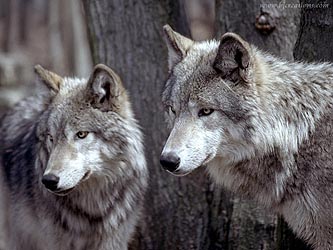 Gray
wolves are highly intelligent and social animals, and have their place in the
ecological balance. The Endangered Species Act has brought the
gray wolf back from the danger of extinction from previous extermination
efforts driven by fear, hatred, and excessive hunting, but recovery is still at
risk. See
Wisconsin's Proposed Wolf Reduction Worries Scientists for
more information. Gray
wolves are highly intelligent and social animals, and have their place in the
ecological balance. The Endangered Species Act has brought the
gray wolf back from the danger of extinction from previous extermination
efforts driven by fear, hatred, and excessive hunting, but recovery is still at
risk. See
Wisconsin's Proposed Wolf Reduction Worries Scientists for
more information.
Results of a 4-year study
by a partnership of the Department of Natural Resources and University of
Wisconsin show that the deer populations are NOT being overly depleted by
wolves. According to
Study Sheds Light on Top Causes of Deer Mortality, the
rates of mortality were: human hunting 43% (higher, if you count 8% poaching),
starvation 9%, coyote 7%, wolf 6% and roadkill 6%.
Studies are showing that
when hunters have broken up traditional wolf packs ("families"), the
survivors are more likely to increase depredations just to survive.
In legitimate cases of
danger to dogs, livestock, and humans, the petition for downlisting to
"threatened" status will allow for the "lethal removal" of
wolves if deemed necessary. This balanced and intelligent
proposal offers an excellent compromise for legitimate concerns while
protecting both wolves as a species and the Endangered Species Act as a whole.
|
| |
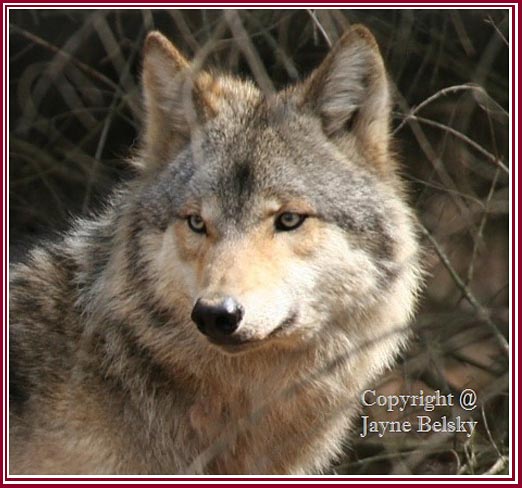
|
| |
Top
 Wisconsin
Wolf Hunt in Brief Wisconsin
Wolf Hunt in Brief 
 WI Wolf Hunt Overview WI Wolf Hunt Overview  WI Wolf Hunt In the
Media WI Wolf Hunt In the
Media 
 Wolf Hunting in Wisconsin: Mainstream Hunters Speak
Out Wolf Hunting in Wisconsin: Mainstream Hunters Speak
Out 
 Some Wolf
Photos on this page from All-About-Wolves.com Some Wolf
Photos on this page from All-About-Wolves.com 
|
|
|
|
|
|
|
WPMP
Home * What Is A Puppy Mill?
What Can I Do About
It? * Laws/Legislation
|
|
|
|
|
©
Copyright, 2015. The Wisconsin Puppy MIll Project
P.O. Box 926 * Sheboygan, WI
53082-0926 * info@NoWisconsinPuppyMills.com
MI Gray Wolf Photo
Copyright © Jayne Belsky and used by permission.
Remaining Wolf Photos
Copyright ©
All-About-Wolves.com.
Website design by
Hook & Web
Designs
|
|